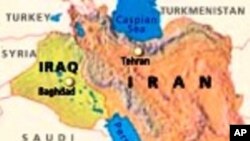Iran is continuing to play a harmful role in Iraq, according to U.S. officials. The U.S. State Department Coordinator for Iraq, David Satterfield, says, “Iran remains lethally engaged in terms of providing training and equipment to the most radical and the most violent forces in Iraq. Attacks by those forces continue.”
Rear Admiral Gregory Smith is a spokesman for the Multi-National Force in Iraq. He says that the so-called “special groups,” extremist Shi’ite militias some of which are backed by Iran, are using secret weapons caches to attack Coalition and Iraqi forces. “Many of these caches have been in Iraq for some time,” said Admiral Smith:
“Iraqis go to Iran, receive the training and return back to Iraq and participate in both training other individuals in the conduct of those same skills, and also organizing to conduct operations. The special groups’ activity has not declined in recent months. They continue to be probably the most violent of the extremist groups that we’re seeing from Shi’a sects. But the intent of Iran in supporting the training and financing of those activities we believe continues.”
Iran recently postponed a fourth round of trilateral talks with Iraq and the United States on the security situation in Iraq. Admiral Smith told reporters that the message Iran should hear about security in Iraq is clear:
“We have been as transparent as we can [be] up here publicly with you regarding Iran’s malign influence in Iraq over the years. And I would suggest that we’ll be equally transparent in our discussions with Iran if and when those talks take place.”
Iranian President Mahmoud Ahmadinejad is planning to visit Iraq in early March. It will be the first state visit by an Iranian president to Baghdad since the 1979 Iranian revolution. U.S. Ambassador to Iraq Ryan Crocker says the U.S. hopes “this would be the occasion for Iran to reassess its long-term national security interests with respect to Iraq.
"I’ve always believed,” he said, “that a stable, secure democratic Iraq is what Iran would want in the long-term. Not a destabilized society, with chronic security problems, which is what Iran’s actual acts on the ground now seem to be aiming at.” The United States hopes that Iran, as a neighbor, would consider actions to foster stability in Iraq, rather than acting to encourage further instability.












